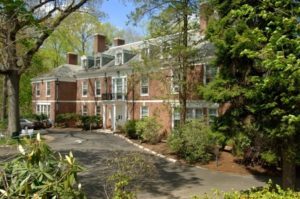
This weekend, July 22nd-24th, AARC members and friends will be having a Shabbaton (a weekend of prayer services and learning) with Rabbi Ora Nitkin-Kaner, who was ordained this year at the Reconstructionist Rabbinical College (RRC). I thought a little background on RRC might be of interest to folks. For this blog I wrote to several rabbis who were ordained at RRC asking them to comment on the education they received.
RRC, a seminary to train rabbis for Reconstructionist Jewish congregations was founded in 1968 in Philadelphia and moved to its location in Wyncote, PA in 1982. The College’s five to six year program of study for rabbinic ordination has changed since 1968, but is still structured around focusing on a different historical period each year, building a deep understanding of Judaism as an evolving religious civilization. This developmental approach encourages the students to enter into a dialogue with previous generations of Jews who addressed perennial human issues in the context of their own times.
The Wikipedia article on RRC usefully divides the college’s own history into three periods: the founding in 1968 till 1981 when, headed by Ira Eisenstein, it formed a course of study based on Mordechai Kaplan’s ideas ; 1981-1993 when the movement published its first prayer book and incorporated more study of other religions and spirituality within Judaism; and 1993 to the present during which the college has significantly expanded education in community organizing, leadership and pastoral counseling. Rabbi Mordechai Liebling ( ’85), who is now director of RRC’s Social Justice Organizing Program and attended RRC during the middle period, says, “the combination of Arthur Green, Arthur Waskow, and Zalman Schacter was a wonderful balance of the political and spiritual dimensions of Jewish life.”
Rabbi Rebecca Alpert ( ’76) wrote the entry on RRC for the Jewish Women’s Archive, which includes this section on the ordination of women:
The question of the ordination of women to the rabbinate certainly was in the public consciousness at the time the Reconstructionist Rabbinical College was founded in 1968. The women’s liberation movement was asking questions about women’s complete equality that had not seriously been considered previously. Although none was yet ordained, several women candidates were then studying at the Reform Movement’s Hebrew Union College. Despite the open discussion of this issue, the founders of the Reconstructionist Rabbinical College decided not to create added controversy by recruiting women for its first class. In its second year, however, when the founders advertised for students, they received one inquiry from a woman. Sandy Eisenberg Sasso was accepted without debate or subsequent controversy. For the next several years, only a few women applied, and all were accepted. Women comprised half the class that entered in 1974, the year of Sandy Sasso’s graduation, and that trend has continued ever since. By 2005, twenty-four out of the movement’s 106 synagogues in the United States had women as senior or assistant rabbis. Women lead four of the country’s twelve largest Reconstructionist congregations, which range in size from 237 to one thousand members. The rabbinical college too has had women as part of upper-level administration and full-time faculty since the mid-1970s. It currently houses Kolot: the Center for Jewish Women’s and Gender Studies, a resource center for curricular and liturgical materials.
An interesting note: Rabbi Shelley Goldman, the last candidate AARC interviewed, wound up taking a full time position as Assistant Rabbi at Congregation Beth-El Zedeck in Indianapolis, IN, where Rabbi Sandy Eisenberg Sasso, RRC’s first women graduate, is Senior Rabbi emerita.
A recent graduate, Rabbi Tamara Cohen (’14) has this to say about her education there: “RRC provided me with a feminist, justice-oriented, intellectually rigorous, ritually creative, alive and nurturing Jewish community and learning environment that helped me take the next steps I had long been yearning to take in my leadership, in my spiritual development, in my critical understanding of Jewish history, text, and culture, in my understanding of community organizing and community building, in my personal soul work, and in my ability to be a pastoral presence and support for those in need. It also gave me invaluable teachers and colleagues and keys to continue to study and grow, lead and belong, as a rabbi over the rest of my life.”
Rabbi Nathan Martin, who will be leading our High Holiday services this year and was ordained from RRC in 2006 wrote, “The three most impactful elements of my RRC rabbinical education were: a) the support and guidance I received as I donned my professional ‘kippah’ doing work in the rabbinic field, b) the way in which the community modeled creative access to tradition and sought to live out their values, and c) having a ‘chevre,’ close colleagues, who helped create a container for me to process and live into my emerging rabbinic identity.”
Please RSVP for Shabbaton events here. You are welcome even if you don’t RSVP, but it sure helps us plan if you do let us know you are coming.
- Tot Shabbat, Friday 7/22, 5:45 to 6:15 PM, JCC
- Kabbalat Shabbat & Potluck, Friday 7/22, 6:30 PM, JCC
- Shabbat Morning Service, Saturday 7/23, 10 am, JCC
- Family-Friendly Dessert and Havdalah, Saturday 7/23, 8-9:30 pm, home of the Samuel family
- Adult Learning, Sunday 7/24, 10:00 AM, JCC: (How) Should A Person Pray?


